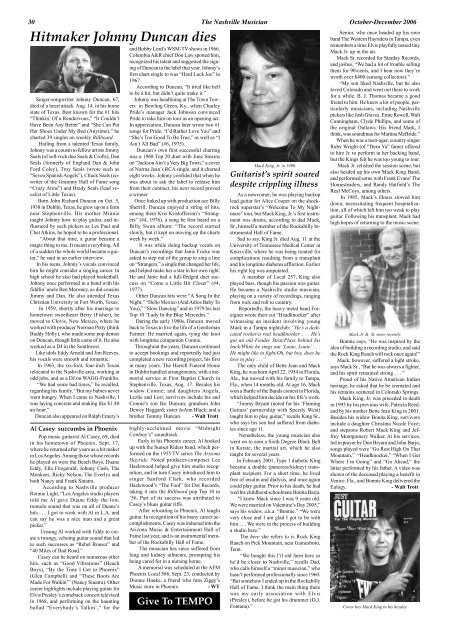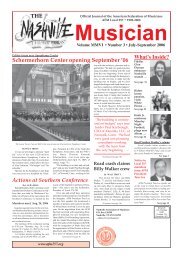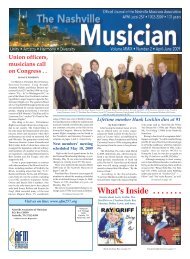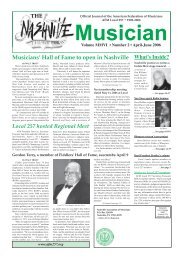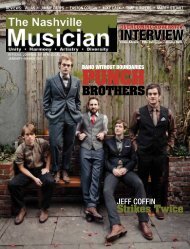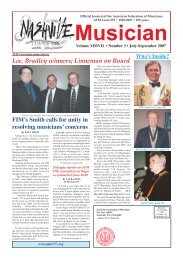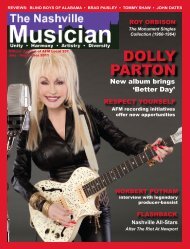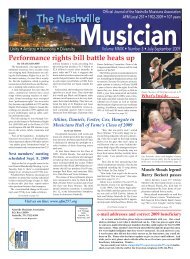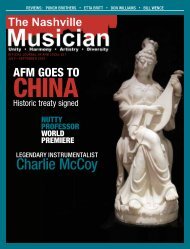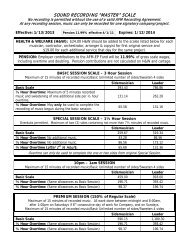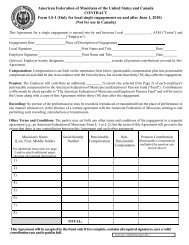Musicians Web pages - Nashville Musicians Association
Musicians Web pages - Nashville Musicians Association
Musicians Web pages - Nashville Musicians Association
- No tags were found...
Create successful ePaper yourself
Turn your PDF publications into a flip-book with our unique Google optimized e-Paper software.
30 The <strong>Nashville</strong> Musician October-December 2006<br />
Hitmaker Johnny Duncan dies<br />
Singer-songwriter Johnny Duncan, 67,<br />
died of a heart attack Aug. 14, in his home<br />
state of Texas. Best known for the #1 hits<br />
“Thinkin’ Of a Rendezvous,” “It Couldn’t<br />
Have Been Any Better” and “She Can Put<br />
Her Shoes Under My Bed (Anytime),” he<br />
charted 39 singles on weekly Billboard.<br />
Hailing from a talented Texas family,<br />
Johnny was a cousin to fellow artists Jimmy<br />
Seals (of soft-rock duo Seals & Crofts), Dan<br />
Seals (formerly of England Dan & John<br />
Ford Coley), Troy Seals (wrote such as<br />
“Seven Spanish Angels”), Chuck Seals (cowriter<br />
of the Grammy Hall of Fame song<br />
“Crazy Arms”) and Brady Seals (lead vocalist<br />
of Little Texas).<br />
Born John Richard Duncan on Oct. 5,<br />
1938 in Dublin, Texas, he grew up on a farm<br />
near Stephenville. His mother Minnie<br />
taught Johnny how to play guitar, and influenced<br />
by such pickers as Les Paul and<br />
Chet Atkins, he hoped to be a professional.<br />
“About that time, a guitar became a<br />
magic thing to me. It meant everything. All<br />
of a sudden the whole world became a guitar,”<br />
he said in an earlier interview.<br />
In his teens, Johnny’s vocals convinced<br />
him he might consider a singing career. In<br />
high school he also had played basketball.<br />
Johnny once performed in a band with his<br />
fiddlin’ uncle Ben Moroney, as did cousins<br />
Jimmy and Dan. He also attended Texas<br />
Christian University in Fort Worth, Texas.<br />
In 1959, shortly after his marriage to<br />
hometown sweetheart Betty (Fisher), he<br />
moved to Clovis, New Mexico, where he<br />
worked with producer Norman Petty (think<br />
Buddy Holly), who made some pop demos<br />
on Duncan, though little came of it. He also<br />
worked as a DJ in the Southwest.<br />
Like idols Eddy Arnold and Jim Reeves,<br />
his vocals were smooth and romantic.<br />
In 1963, the six-foot, four-inch Texan<br />
relocated to the <strong>Nashville</strong> area, working at<br />
odd jobs, and as a DJ on WAGG-Franklin.<br />
“We had some bad times,” he recalled,<br />
regarding his family. “But my babies never<br />
went hungry. When I came to <strong>Nashville</strong>, I<br />
was laying concrete and making like $1.40<br />
an hour.”<br />
Duncan also appeared on Ralph Emery’s<br />
Al Casey succumbs in Phoenix<br />
Pop music guitarist Al Casey, 69, died<br />
in his hometown of Phoenix, Sept. 17,<br />
where he returned after years as a hit maker<br />
in Los Angeles. Among those whose records<br />
he played on were the Beach Boys, Duane<br />
Eddy, Ella Fitzgerald, Johnny Cash, The<br />
Monkees, Ricky Nelson, The Everlys and<br />
both Nancy and Frank Sinatra.<br />
According to <strong>Nashville</strong> producer<br />
Ronnie Light, “Los Angeles studio players<br />
told me Al gave Duane Eddy the low,<br />
tremolo sound that was on all of Duane’s<br />
hits . . . I got to work with Al in L.A. and<br />
can say he was a nice man and a great<br />
picker.”<br />
Unsung Al worked with Eddy to create<br />
a twangy, echoing guitar sound that led<br />
to such successes as “Rebel Rouser” and<br />
“40 Miles of Bad Road.”<br />
Casey can be heard on numerous other<br />
hits, such as “Good Vibrations” (Beach<br />
Boys), “By the Time I Get to Phoenix”<br />
(Glen Campbell) and “These Boots Are<br />
Made For Walkin’” (Nancy Sinatra). Other<br />
career highlights include playing guitar for<br />
Elvis Presley’s comeback concert televised<br />
in 1968, and performing on the haunting<br />
ballad “Everybody’s Talkin’,” for the<br />
and Bobby Lord’s WSM-TV shows in 1966.<br />
Columbia A&R chief Don Law spotted him,<br />
recognized his talent and suggested the signing<br />
of Duncan to the label that year. Johnny’s<br />
first chart single to was “Hard Luck Joe” in<br />
1967.<br />
According to Duncan, “It tried like hell<br />
to be a hit, but didn’t quite make it.”<br />
Johnny was headlining at The Town Towers<br />
in Bowling Green, Ky., when Charley<br />
Pride’s manager Jack Johnson convinced<br />
Pride to take him on tour as an opening act.<br />
In appreciation, Duncan later wrote two #1<br />
songs for Pride, “I’d Rather Love You” and<br />
“She’s Too Good To Be True,” as well as “I<br />
Ain’t All Bad” (#6, 1975).<br />
Duncan’s own first successful charting<br />
was a 1968 Top 20 duet with June Stearns<br />
on “Jackson Ain’t a Very Big Town,” a cover<br />
of Norma Jean’s RCA single, and it charted<br />
eight weeks. Johnny confided that when he<br />
was about to ask the label to release him<br />
from their contract, his next record proved<br />
a winner.<br />
Once linked up with production ace Billy<br />
Sherrill, Duncan enjoyed a string of hits,<br />
among them Kris Kristofferson’s “Strangers”<br />
(#4, 1976), a song he first heard on a<br />
Billy Swan album: “The record started<br />
slowly, but it kept on moving up the charts<br />
week by week.”<br />
It was while doing backup vocals on<br />
Duncan’s recordings that Janie Fricke was<br />
asked to step out of the group to sing a line<br />
on “Strangers,” a single that changed her life,<br />
and helped make her a star in her own right.<br />
He and Janie had a full-fledged duet success<br />
on “Come a Little Bit Closer” (#4,<br />
1977).<br />
Other Duncan hits were “A Song In the<br />
Night,” “Hello Mexico (And Adios Baby To<br />
You),” “Slow Dancing” and in 1979 his last<br />
Top 10 “Lady In the Blue Mercedes.”<br />
During the early 1980s, Duncan moved<br />
back to Texas to live the life of a Gentleman<br />
Farmer. He married again, tying the knot<br />
with longtime companion Connie.<br />
Throughout the years, Duncan continued<br />
to accept bookings and reportedly had just<br />
completed a new recording project, his first<br />
in many years. The Harrell Funeral Home<br />
in Dublin handled arrangements, with a memorial<br />
service at First Baptist Church in<br />
Stephenville, Texas, Aug. 17. Besides his<br />
widow Connie; and daughters Angela,<br />
Lezlie and Lori; survivors include his and<br />
Connie’s son Ike Duncan; grandson John<br />
Dewey Haggard; sister JoAnn Black; and a<br />
brother Tommy Duncan. - Walt Trott<br />
highly-acclaimed movie “Midnight<br />
Cowboy’s” soundtrack.<br />
Early in his Phoenix career, Al hooked<br />
up with the Sunset Riders band, which performed<br />
on the 1955 TV series The Arizona<br />
Hayride. Noted producer-composer Lee<br />
Hazlewood helped give him studio recognition,<br />
and in turn Casey introduced him to<br />
singer Sanford Clark, who recorded<br />
Hazlewood’s “The Fool” for Dot Records,<br />
taking it into the Billboard pop Top 10 in<br />
’56. Part of its success was attributed to<br />
Casey’s blues guitar riffs.<br />
After relocating to Phoenix, Al taught<br />
guitar. In recognition of his many career accomplishments,<br />
Casey was inducted into the<br />
Arizona Music & Entertainment Hall of<br />
Fame last year, and is an instrumental member<br />
of the Rockabilly Hall of Fame.<br />
The musician has since suffered from<br />
lung and kidney ailments, prompting his<br />
being cared for in a nursing home.<br />
A memorial was scheduled at the AFM<br />
Phoenix Local 586, Sept. 23, conducted by<br />
Dionne Hauke, a friend who runs Ziggy’s<br />
Music store in Phoenix. - WT<br />
Give To TEMPO<br />
Mack King, Jr. in 1990.<br />
Guitarist’s spirit soared<br />
despite crippling illness<br />
As a newcomer, he was playing backup<br />
lead guitar for Alice Cooper on the shockrock<br />
superstar’s “Welcome To My Nightmare”<br />
tour, but Mack King, Jr.’s first instrument<br />
was drums, according to dad Mack,<br />
Sr., himself a member of the Rockabilly Instrumental<br />
Hall of Fame.<br />
Sad to say, King Jr. died Aug. 11 at the<br />
University of Tennessee Medical Center in<br />
Knoxville, where he was being treated for<br />
complications resulting from a transplant<br />
and his longtime diabetes affliction. Earlier<br />
his right leg was amputated.<br />
A member of Local 257, King also<br />
played bass, though his passion was guitar.<br />
He became a <strong>Nashville</strong> studio musician,<br />
playing on a variety of recordings, ranging<br />
from rock and roll to country.<br />
Reportedly, the heavy metal band Foreigner<br />
wrote their cut “Headknocker” after<br />
witnessing an incident involving young<br />
Mack in a Tampa nightclub: “He’s a dedicated<br />
rocker/a real headknocker . . . He’s<br />
got an old Fender Strat/Plays behind his<br />
back/While he sings out ‘Louie, Louie’ . . .<br />
He might like to fight/Oh, but boy, does he<br />
love to play . . .”<br />
The only child of Bette Jean and Mack<br />
King, he was born April 22, 1954 in Florala,<br />
Ala., but moved with his family to Tampa,<br />
Fla., when 14 months old. At age 16, Mack<br />
won a Battle of the Bands contest in Florida,<br />
which helped him decide on his life’s work.<br />
“Jimmy Bryant (noted for his ‘Flaming<br />
Guitars’ partnership with Speedy West)<br />
taught him to play guitar,” recalls King Sr.,<br />
who says his son had suffered from diabetes<br />
since age 11.<br />
Nonetheless, the young musician also<br />
went on to earn a Sixth Degree Black Belt<br />
in Karate, the martial art, which he also<br />
taught for several years.<br />
In February 2001, Type 1 diabetic King<br />
became a double (pancreas/kidney) transplant<br />
recipient. For a short time, he lived<br />
free of insulin and dialysis, and once again<br />
could play guitar. Prior to his death, he had<br />
wed his childhood schoolmate Bonita Barja.<br />
“I knew Mack since I was 9 years old.<br />
We were married on Valentine’s Day 2005,”<br />
says his widow, a.k.a. “Bonnie.” “We were<br />
very close and I am glad I got to be with<br />
him . . . We were in the process of building<br />
a studio here.”<br />
The here she refers to is Rock King<br />
Ranch on Pick Mountain, near Gainesboro,<br />
Tenn.<br />
“We bought this l’il old farm here so<br />
he’d be closer to <strong>Nashville</strong>,” recalls Dad,<br />
who calls himself a “minor musician,” who<br />
hasn’t performed professionally since 1960.<br />
“But somehow I ended up in the Rockabilly<br />
Hall of Fame. I think the main thing there<br />
was my early association with Elvis<br />
(Presley), before he got his drummer (D.J.<br />
Fontana).”<br />
Senior, who once headed up his own<br />
band The Western Hayriders in Tampa, even<br />
remembers a time Elvis playfully tossed tiny<br />
Mack Jr. up in the air.<br />
Mack Sr. recorded for Starday Records,<br />
and joshes, “We had a lot of trouble selling<br />
them for 90-cents, and I hear now they’re<br />
worth over $400 (among collectors).”<br />
“My son liked <strong>Nashville</strong>, but he also<br />
loved Colorado and went out there to work<br />
for a while. B. J. Thomas became a good<br />
friend to him. He knew a lot of people, particularly<br />
musicians, including <strong>Nashville</strong><br />
pickers like Josh Graves, Ernie Rowell, Walt<br />
Cunningham, Clyde Phillips, and some of<br />
the original Outlaws. His friend Mark, I<br />
think, was soundman for Martina McBride.”<br />
When he was a teen-ager, country singer<br />
Ruby Wright (of “Dern Ya” fame) offered<br />
to hire Jr. to perform in her backing band,<br />
but the Kings felt he was too young to tour.<br />
Mack Jr. relished the session scene, but<br />
also headed up his own Mack King Band,<br />
and performed some with Frank Evans’ The<br />
Homesteaders, and Randy Hatfield’s The<br />
Real McCoys, among others.<br />
In 1985, Mack’s illness slowed him<br />
down, necessitating frequent hospitalization,<br />
all of which left him too weak to play<br />
guitar. Following his transplant, Mack had<br />
high hopes of returning to the music scene.<br />
Mack Jr. & Sr. more recently.<br />
Bonnie says, “He was inspired by the<br />
idea of building a recording studio, and said<br />
the Rock King Ranch will rock once again!”<br />
Mack, however, suffered a light stroke,<br />
says Mack Sr., “But he was always a fighter,<br />
and his spirit remained strong . . . ”<br />
Proud of his Native American Indian<br />
heritage, he asked that he be cremated and<br />
his remains scattered in Colorado Springs.<br />
Mack King, Jr. was preceded in death<br />
in 1995 by his previous wife, Patricia Reed;<br />
and by his mother Bette Jean King in 2001.<br />
Besides his widow Bonita King, survivors<br />
include a daughter Christina Nicole Foye;<br />
and stepsons Robert Mack King and Jeffrey<br />
Montgomery Walker. At his services,<br />
led in prayer by Don Bryant and John Barja,<br />
songs played were “Go Rest High On That<br />
Mountain,” “Headknocker,” “When I Get<br />
Where I’m Going” and “Go Ahead,” the<br />
latter performed by his father. A video was<br />
shown of the deceased playing a benefit in<br />
Venice, Fla., and Bonnie King delivered the<br />
Eulogy. - Walt Trott<br />
Cover boy Mack King in his heyday.


